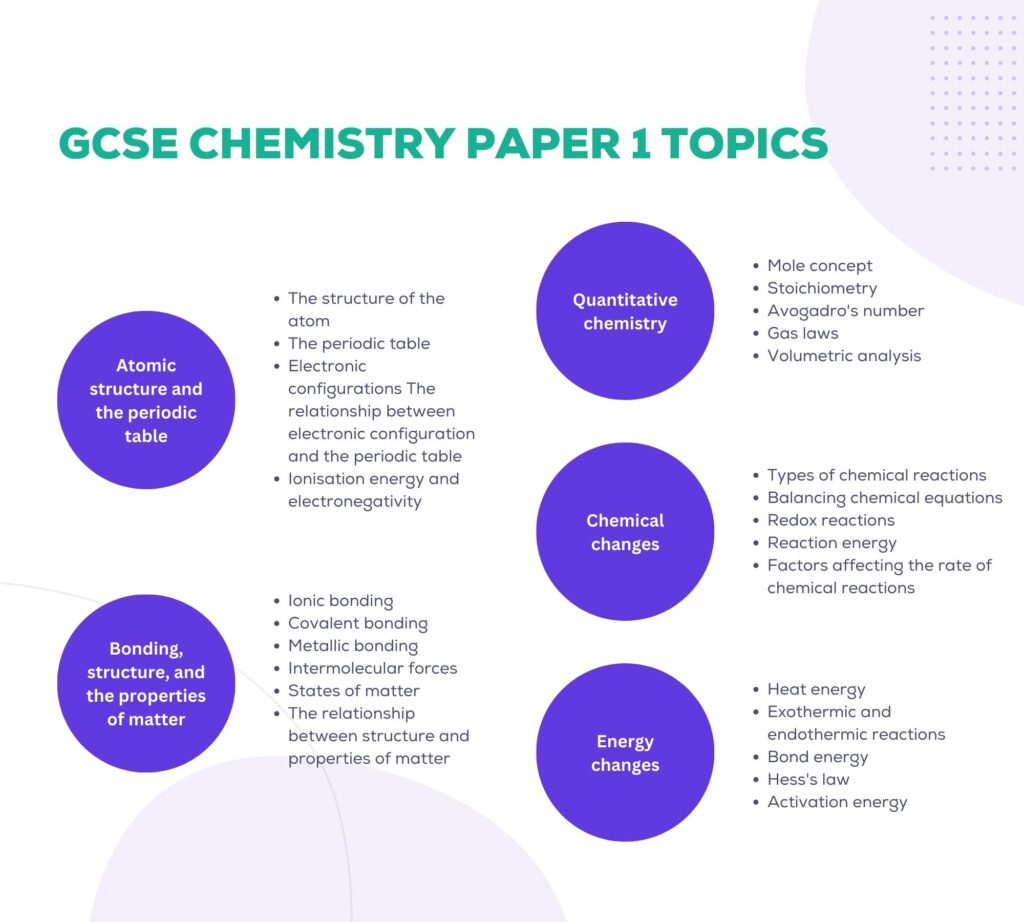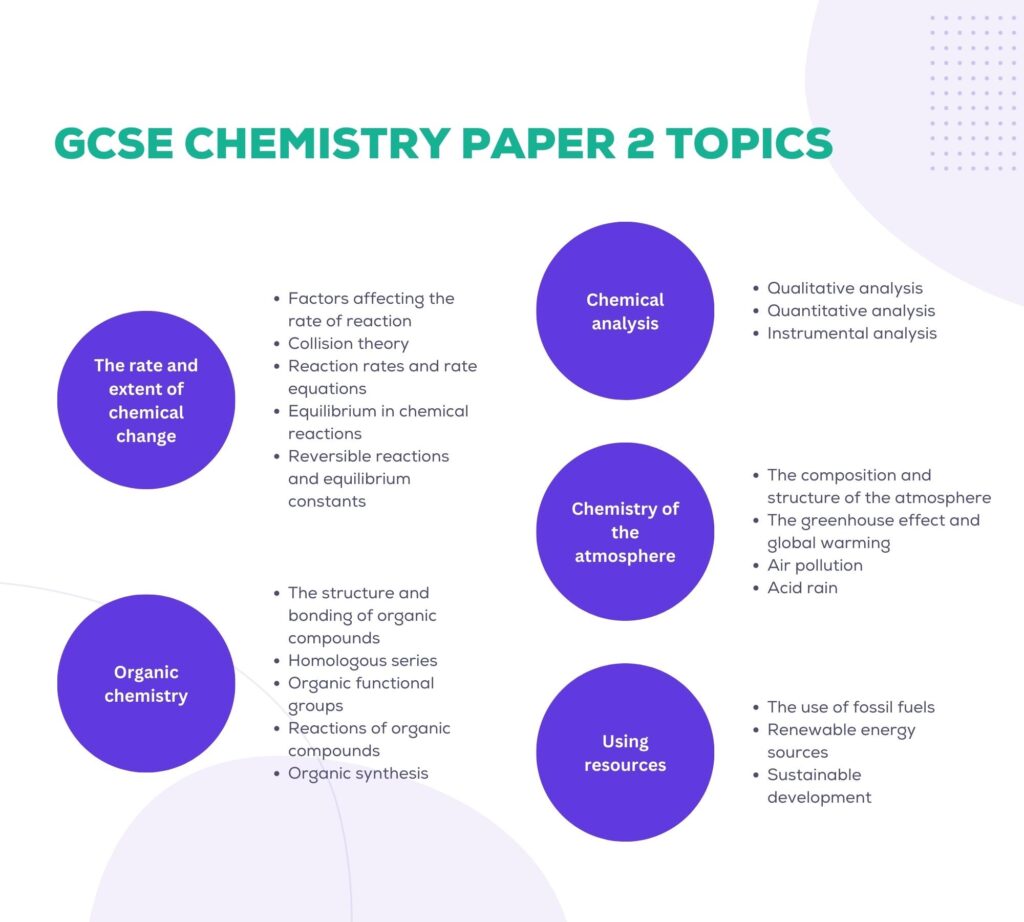AQA GCSE Chemistry
| Years | Question Papers | Assessment |
| November 2020 | Foundation Tier Paper 1 | Mark Scheme |
| November 2021 | Higher Tier Paper 1 | Mark Scheme |
| June 2022 | Foundation Tier Paper 2 | Mark Scheme |
| June 2023 | Higher Tier Paper 2 | Mark Scheme |
| June 2024 | Higher Tier Paper 2 | Mark Scheme |
OCR GCSE Chemistry
| Years | Question Papers | Assessment |
| November 2020 | Foundation Tier Paper 1 | Mark Scheme |
| November 2021 | Higher Tier Paper 3 | Mark Scheme |
| June 2022 | Foundation Tier Paper 2 | Mark Scheme |
| June 2023 | Higher Tier Paper 4 | Mark Scheme |
| June 2024 | Foundation Tier Paper 1 | Mark Scheme |
Pearson Edexcel
| Years | Question Papers | Assessment |
| November 2020 | Paper 1C | Mark Scheme |
| November 2021 | Paper 2C | Mark Scheme |
| June 2022 | Paper 1C | Mark Scheme |
| June 2023 | Paper 2C | Mark Scheme |
| June 2024 | Paper 1C | Mark Scheme |


You may find interesting:
FAQs:
What Topics are Covered in GCSE Chemistry?
GCSE chemistry is a subject that focuses on the composition, structure, properties and reactions of matter. Some of the topics covered in GCSE chemistry include Atomic structure and the periodic table, Bonding, structure, and properties of matter, Quantitative chemistry, Chemical changes and Energy changes. However, it’s important to note that the exact topics covered may vary depending on the examination board and it is best to consult the relevant examination board’s specifications to get a more accurate list of the topics covered in GCSE chemistry.
What is the Format of the GCSE Chemistry Exam?
The format of the GCSE chemistry exam varies depending on the examination board, but it typically includes multiple-choice, short-answer, and extended-response questions.
How is GCSE Chemistry Graded?
GCSEs are graded using a numerical system from 9 to 1, with 9 being the highest and 1 being the lowest. This system was introduced in 2017, replacing the old GCSE grading system that awarded students letter grades from A* to G. In the current grading system, a score of 9, 8 and 7 are equivalent to an A* and A.
Exam boards will use statistics so that broadly the same proportion of students will achieve a grade 4 and above as previously achieved a grade C and above in the legacy GCSE single science qualifications.
It is important to note that the grading scheme of the GCSE chemistry exam may vary depending on the examination board. It is best to consult the relevant examination board’s specification to get a more accurate picture of the grading scheme of the GCSE chemistry exam.
How to Prepare for GCSE Chemistry
One of the best ways to prepare for the GCSE chemistry exam is to practice AQA GCSE chemistry past papers. Doing past papers will help you familiarise yourself with the exam format, question style, and time pressure. Past papers are an essential tool for chemistry revision. Getting used to past papers will help you to understand the way the GCSE subject is structured and to identify areas where you need to focus your revision.
You should also study the topics covered in class, review key concepts and vocabulary, and make sure you understand the main principles of chemistry. Additionally, it’s also recommended to use flashcards to memorize formulas, equations and important concepts. Furthermore, you can also seek help from a GCSE chemistry tutor or teacher if you have difficulties understanding certain topics.
How to Use GCSE Chemistry Past Papers Correctly?
- Start by identifying the exam board and the specific syllabus you will be tested on. Make sure you have access to the correct past papers that match your exam board and syllabus.
- Set a realistic time limit for yourself when completing each past paper. This will help you to get used to the time pressure of the actual exam.
- Use past papers to identify areas of weakness. If you are struggling with a particular concept or topic, make sure to focus your revision on that area.
- Check your answers against the mark scheme provided. This will help you to understand what the examiners are looking for and how they award marks.
- Use past papers to practice different question types, such as multiple choice, short-answer, and extended response questions.
- Practice under exam conditions. Find a quiet place to work, simulate exam conditions, and avoid distractions.
- Review your performance regularly, identify the areas where you need to improve and focus on them in your revision.
- Use past papers as a way to track your progress and set goals for yourself. Keep track of your progress and use your results to set targets for yourself.
What are the Career Opportunities for Someone who has Studied GCSE Chemistry?
- Chemical technician
- Research chemist
- Medical and clinical laboratory technologist
- Quality control inspector
- Environmental Consultant
- Food Scientist
- Environmental chemist
- Pharmaceutical researcher
- Materials scientist
- Cosmetics chemist
It is important to note that this is not an exhaustive list, and many other career opportunities are available for someone who has studied GCSE chemistry. The specific career opportunities available to an individual will depend on their qualifications, experience, and personal interests.
Should You Know GCSE Periodic Table by Heart?
It is not necessary to know the periodic table by heart for a GCSE exam, as you will be provided with a periodic table during the exam. However, it is important to understand the basics of the periodic table, including what periods and groups have in common and how elements are arranged within them.








